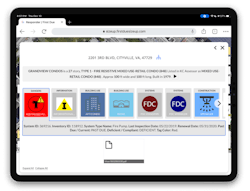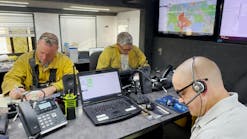First Due, The Compliance Engine Partner for Fire Prevention, Pre-Incident Planning
First Due, known to fire and emergency response agencies across the US for developing a premier, next-generation suite of Fire & EMS software, announced today a partnership with BRYCER TCE (The Compliance Engine), the industry leader in system tracking and testing code compliance.
The partnership will enable agencies to access critical fire protection system, backflows, and elevator inspection data recorded using The Compliance Engine, within First Due - before, during and after an incident.
“A major First Due feature is gathering information on every structure in a response area and empowering operations and prevention personnel with the data they need to make better decisions,” explains COO and Head of Product Rami El-Choufani. “The ability to know when critical fire protection systems are deficient or inoperable, helps agencies respond more effectively and reduce risk within the community.”
TCE information collected by service providers, will allow inspectors to access system details, inventory information and statuses at the time of an inspection – driving compliance and allowing prioritization of prevention activities. For Operations, crews with be able to easily drag-and-drop systems information onto the map within First Due’s pre-plan tool and more importantly, access critical system information alerts at the time of response.
“When crews are dispatched, knowing a fire pump is red-tagged and inoperable, will make a massive difference in how they approach the incident – reducing risk to first responders and the communities they serve” El-Choufani continues.
Users of TCE will be looking forward to adding a completely new dimension in the way they utilize system and compliance information. BRYCER Vice President of Innovation Bryan Schultz elaborates, “Fire protection system reliability is a vital component of all fire department's community risk reduction strategies. Putting the fire protection system compliance information into first responders' hands is a giant step forward in BRYCER's goal of ensuring safe communities by reducing fire risk. We are excited to partner with First Due on this project as our complimentary solutions will provide enormous benefits to any Fire Department."
For more information about the First Due and TCE Partnership and to get-in-touch with both the First Due and BRYCER TCE teams, please visit https://www.firstduesizeup.com/partnerships/tce.
ABOUT FIRST DUE
Backed by Collate Capital, NY Angels, Inc., Teamworthy Ventures and Technexus Venture Collaborative, New York-based First Due has reimagined public-safety technology for agencies nationwide. The SaaS First Due Suite provides Fire & EMS agencies an end-to-end solution to consolidate all core components of their operation in a single platform.
Departments with First Due are transforming how they function, before, during and after an incident - ultimately leading to better decisions and a safer community.
ABOUT THE COMPLIANCE ENGINE
The Compliance Engine is a simple, Internet-based tool for Fire Prevention Bureaus to track and drive inspection and testing code compliance, reduce false alarm activity, ensure clean drinking water and provide a safer community.
TCE provides a secure cloud environment in which third-party contractors that inspect, test, and maintain fire protection systems, submit their reports via BRYCER’s web portal directly to the Authority Having Jurisdiction, facilitating a more efficient review, tracking, and follow-up process with occupants to correct deficiencies and maintain systems.
BRYCER provides proactive services, in addition to the web-based technology, that includes; hard and soft copy notifications, call services, analytics, consultation, 24hr support and market education to help increase testing and maintenance activity in a given jurisdiction. The end result is a comprehensive and accurate aggregation of data around which buildings have what types of systems when they were last tested, and if there are any open deficiencies that could jeopardize their successful deployment in the event of an incident.






